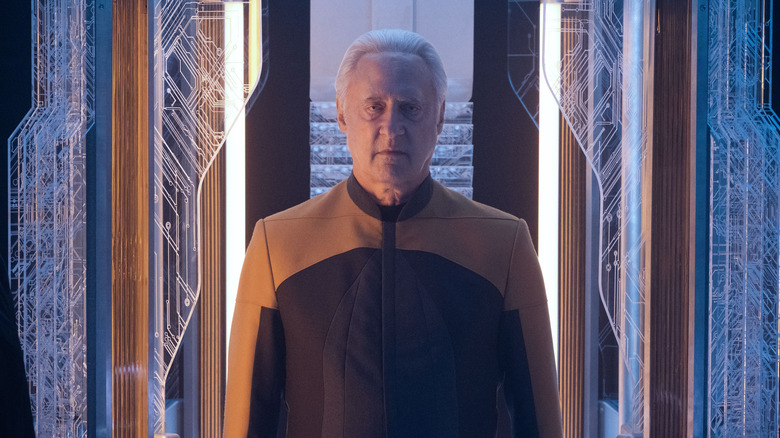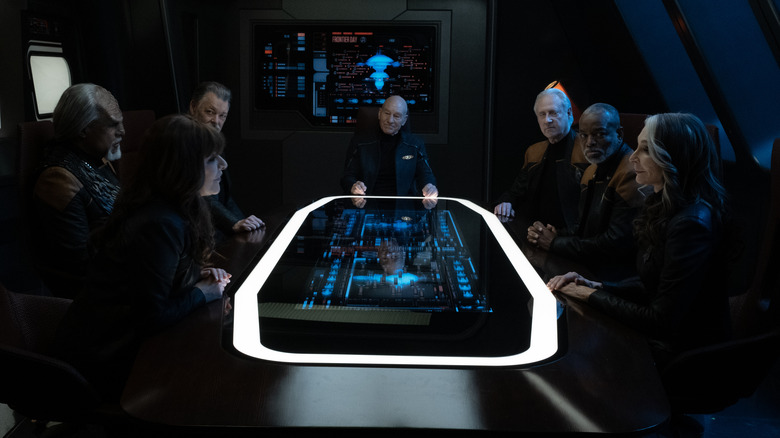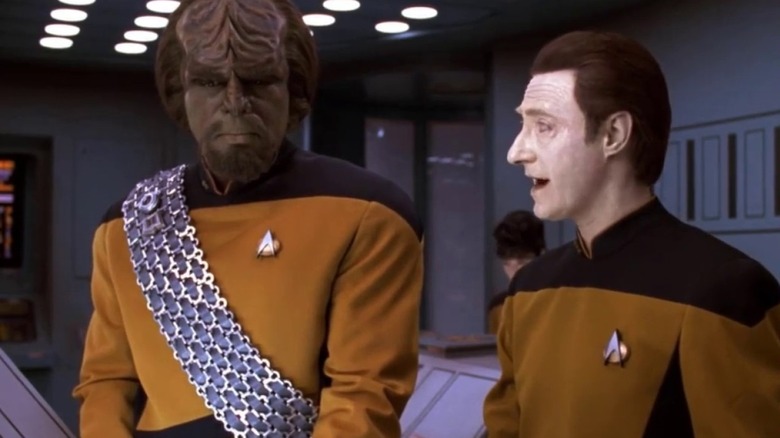Michael Dorn Improvised Worf's Reaction To Data's Return In Picard: Season 3
This post contains spoilers for "Star Trek: Picard" season 3.
In the sixth episode of "Star Trek: Picard" season 3, called "The Bounty," Data (Brent Spiner) — or an updated rendition of him — was introduced to the cast. Raffi (Michelle Hurd), Riker (Jonathan Frakes), and Worf (Michael Dorn) were stalking about a mysterious, high-security black site called Daystrom Station, looking for what high-tech weapon might have been stolen by a shadowy cabal of wicked Changelings. The trio finds that the station's security measures have been tied into a powerful artificial intelligence that has been, bafflingly, projecting holograms that they might recognize. Eventually, they find that the AI in question is, in fact, the android brain of Data, who had been reconstructed again after two previous "deaths."
The "Star Trek: Picard" version of Data, however, is sort of a new character. Not only does he now look like a 74-year-old man (Spiner is 74), but his brain contains several different personalities at once. Arik Soong (also Spiner) reconstructed the android to contain Data, his evil twin Lore, his daughter Lal, his creator Dr. Noonien Soong, and his prototype B-4. Later in the series, Spiner acts opposite himself in a dream-like sequence as Data and Lore abstractly fight for dominance over one body. Data wins out.
At the end of the eighth episode of "Picard," all of the main "Star Trek: The Next Generation" cast members have finally been gathered together, and the showrunners indulged in a glory shot of Spiner, Frakes, Dorn, Patrick Stewart, Marin Sirtis, LeVar Burton, and Gates McFadden sitting around a conference table for the first time in decades.
If you look closely at Dorn, you can tell Worf doesn't much care about Data's presence there.
According to a recent interview with Collider, showrunner Terry Matalas said that Dorn's reaction was improvised ... and weirdly appropriate for the character.
Surely, that's not really Data
The reunion scene was treacly, of course, but since it took eight episodes to get there, the nostalgia was well-earned. These characters, each of them hovering around their 80s, 90s, and 100s, were permitted to feel a little sentimental about seeing their old co-workers again. Dr. Crusher and Deanna Troi get to have a moment of bonding, and Matalas insisted they sit opposite one another so they could hold hands and make eye contact. In his words: "I wish we had time to make it longer, and they could say more."
One can hope that all real-life work reunions, convened by circumstances decades after the fact, are as amenable. Indeed, it's a little odd that there is no awkwardness or resentment at this occasion. Well, except for Worf, who didn't look kindly at the 74-year-old-looking android across from him. True to his character, Worf was not sentimental. Matalas recalled Dorn's performance, and assigned it subtext, saying:
"What is interesting was that Michael Dorn had decided, in this moment of nostalgia, that he would be the only one who wasn't entirely touched that Data had returned. In his mind, he was like, 'Whatever, this isn't our Data. I don't care about the robot.' That was kind of funny. So, in that scene, as Data's talking, he's kind of like, 'All right, whatever. Let's just get to the meeting,' if you really look at it, which is funny. So, there's some road to travel with those two characters, if you ever bring them back."
Data and Worf
Worf is not a sentimental character, so his brusque ignoring of Data is wholly appropriate. Indeed, Worf, while seeing them as capable fellow crewmates, likely doesn't have a terribly warm regard for most of the characters in that room. He respects them and finds them all stalwart and honorable, but he's not the kind to hug and smile. He respects Captain Picard and Commander Riker as capable and intelligent commanders, of course. He likely sees Dr. Crusher as a respected expert in her field, as he did with Geordi La Forge. While Data and Worf were both outsiders on the Enterprise — one was the only Klingon, the other the only android — they never properly bonded; their conversations consisted of mutual befuddlement over human behavior.
The only character Worf had any kind of sentimentality toward was Deanna Troi. The characters were briefly in love, and her sensitivity and knowledge of the human mind provided Worf with some much-needed inner balance. When he reunited with Troi, Worf immediately — while they were still in the jail cell she was being sprung from — expressed his unending gratitude for her wisdom, her empathy, and her teachings. Worf deliberately doesn't possess any kind of social tact, so he would indeed say what he felt he needed to in the moment.
That Worf ignores Data isn't coldness or resentment, but a mere matter of his sense of propriety and practicality.
In the season's ninth episode, "Võx," the main characters board a restored Enterprise-D, wistful to be back on the ship they served on for eight years. But Worf takes one look and says he prefers the Enterprise-E. It had a better tactical station and better weapons. The heck with nostalgia.


